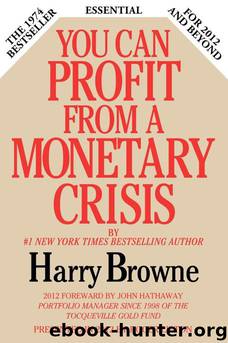You Can Profit From A Monetary Crisis by Harry Browne

Author:Harry Browne [Browne, Harry]
Language: eng
Format: epub
ISBN: 9780985253912
Publisher: Lipton Financial Services, Inc.
Published: 2012-06-03T04:00:00+00:00
TYPES OF BANKS
Banks in Switzerland are loosely categorized according to type, but many banks fit more than one type. Of the approximately seven types, there are three that can be useful for nonresidents:
1. The Big Banks: There are three banks referred to by that label: Union Bank of Switzerland, Swiss Bank Corporation, and Swiss Credit Bank. The assets of these banks are far greater than any of the others. They are “retail” banks in every sense of the word—with branches all over Switzerland and banking facilities that resemble American banks.
These banks offer most of the services that any Swiss bank offers, and appeal to customers of all income classes. Most types of accounts can be opened without minimum amounts required.
The banks accept new accounts by mail from anywhere in the world. However, they will ask that your signature be notarized by a branch or office of the bank in the United States, by the Swiss Consulate office, or by a U.S. bank that’s a correspondent of the Swiss bank. If you have the signature verified at a U.S. office of the Swiss bank or at the Swiss Consulate, no record is kept of the notarization.
The big three banks all have offices or branches in the United States—in New York and some other cities. These offices can be contacted for information. However, there’s no need to open an account through them; it’s just as easy, and more private, to handle it by mail directly with the offices in Switzerland.
It should be understood that Swiss bank branches in countries other than Switzerland are subject to all laws of the country where they’re located.
The big banks are accessible and friendly. However, it’s more difficult to establish a relationship with one individual within the bank, someone you can write to whenever you have questions—and that’s usually helpful.
Sometimes, references are made to the “big five” Swiss banks —in which case the reference includes Swiss Volksbank and Bank Leu.
2. The Private Banks: This type of bank is a unique institution. It’s usually operated by a family, with the ownership passing from generation to generation.
The private banks are not corporations and so they don’t have limited liability, as corporations do. The owner of a private bank is responsible for all liabilities to the extent of his personal fortune. Because the liability isn’t limited, financial statements aren’t published.
Private banks aren’t retail banks. Their offices are more like the offices of a large company; there are no lobbies filled with tellers as in regular banks. They perform all the same services that the other banks do, but they choose their customers carefully. Generally, they’re interested only in large accounts, and especially trust accounts in which they will manage a customer’s investments for him.
Private banks rarely accept new accounts from strangers by mail. They may accept an account if it comes with references—from mutual friends or present clients. They also accept new accounts when Opened in person, after an exploratory interview. Minimum accounts are usually 100,000 francs or more (around $35,000).
Download
This site does not store any files on its server. We only index and link to content provided by other sites. Please contact the content providers to delete copyright contents if any and email us, we'll remove relevant links or contents immediately.
The Black Swan by Nassim Nicholas Taleb(7104)
Bad Blood by John Carreyrou(6610)
Pioneering Portfolio Management by David F. Swensen(6283)
Millionaire: The Philanderer, Gambler, and Duelist Who Invented Modern Finance by Janet Gleeson(4462)
Skin in the Game by Nassim Nicholas Taleb(4235)
The Money Culture by Michael Lewis(4196)
Bullshit Jobs by David Graeber(4177)
Skin in the Game: Hidden Asymmetries in Daily Life by Nassim Nicholas Taleb(3987)
The Wisdom of Finance by Mihir Desai(3727)
Blockchain Basics by Daniel Drescher(3574)
Liar's Poker by Michael Lewis(3441)
Fooled by Randomness: The Hidden Role of Chance in Life and in the Markets by Nassim Nicholas Taleb(3105)
Hands-On Machine Learning for Algorithmic Trading by Stefan Jansen(3065)
Mastering Bitcoin: Programming the Open Blockchain by Andreas M. Antonopoulos(3035)
The Intelligent Investor by Benjamin Graham Jason Zweig(3034)
The Power of Broke by Daymond John(2972)
Investing For Dummies by Eric Tyson(2948)
You Are What You Risk by Michele Wucker(2740)
Market Wizards by Jack D. Schwager(2695)
